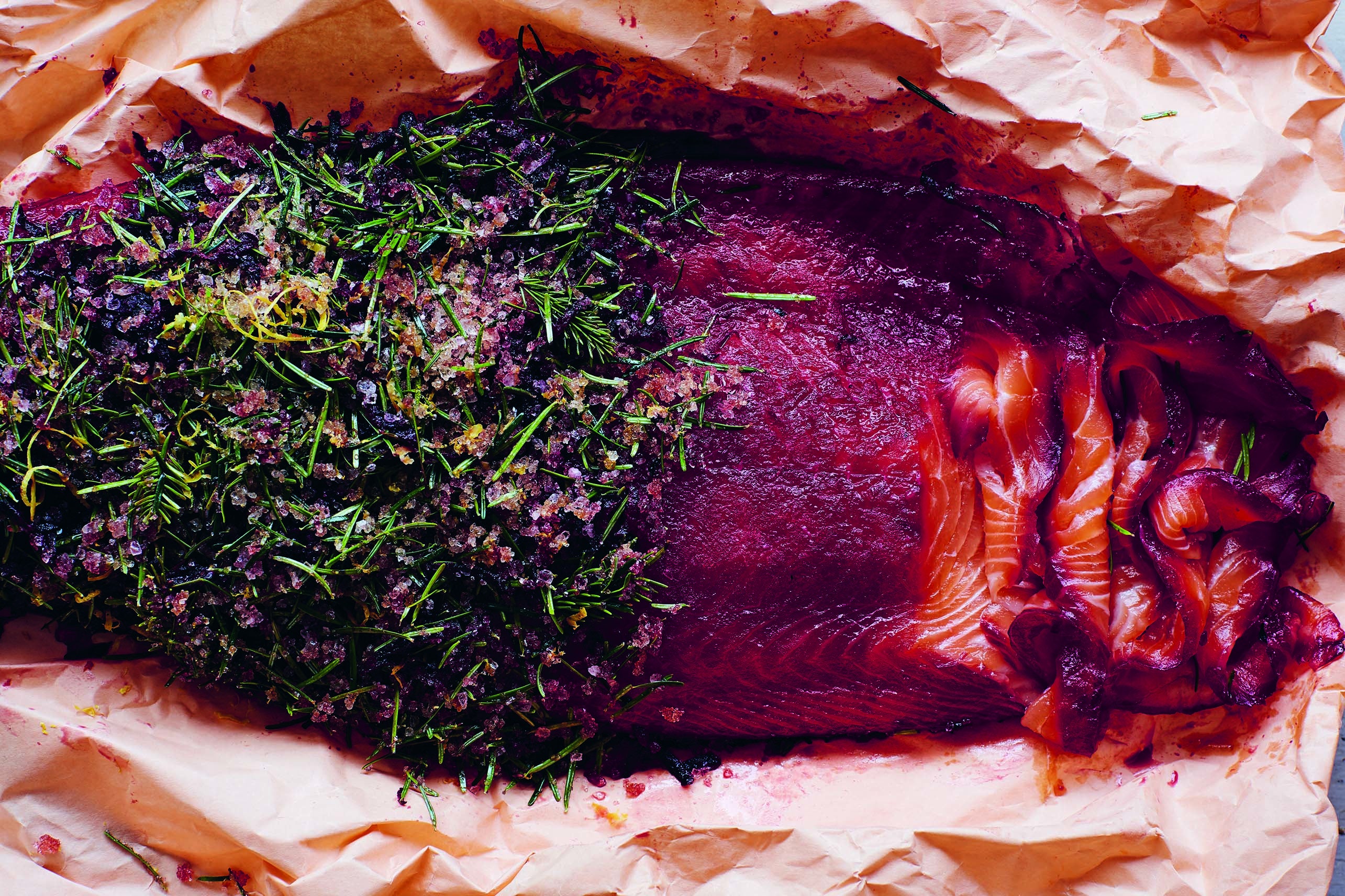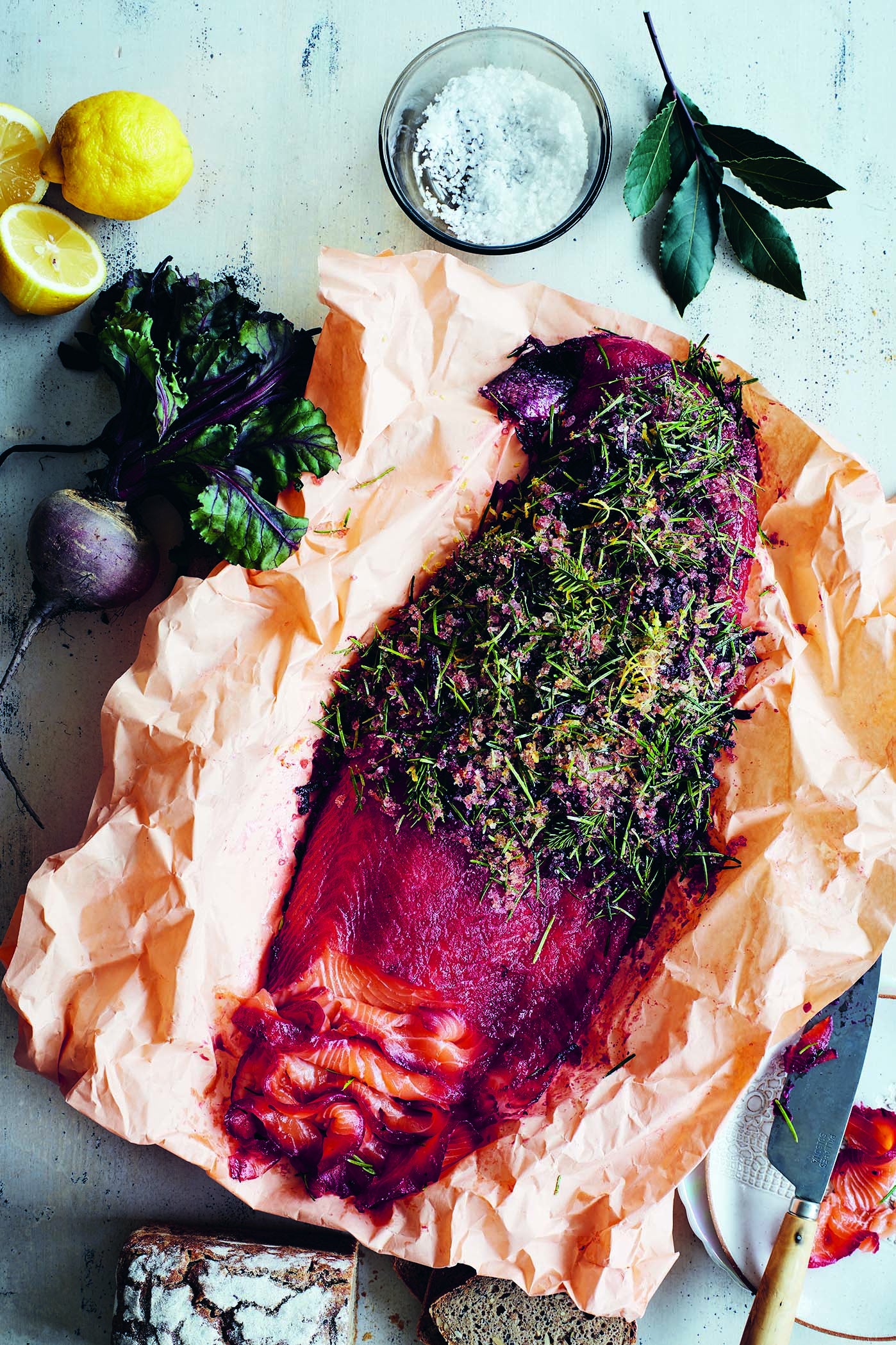‘How to Eat Your Christmas Tree’ cookbook: Recipes from pine-needle fish to gin-pulled lamb
Julia Georgallis’s recipes bring a luxurious and festive flavour to Christmas this year in her new book

Christmas-cured fish
Cured fish is wonderful for starters, breakfast, or in a very decadent sandwich. Trout is a great option for curing or use other sustainable fish, such as monkfish, halibut, or something recommended by your local fishmonger. Use the freshest fish you can find, making sure it hasn’t been frozen before buying.
2kg filleted fish of your choice
350g fir or spruce needles or 700g pine needles (or a combination)
770g demerara sugar
500g table salt
2 small beetroots
Grated zest of 3 lemons
Before you cure, it is good practice to freeze the fish as this kills any bacteria that might be present. You can “flash freeze” for 24 hours, but I like to freeze the fish for about a week. Defrost it in the refrigerator a few hours before you start curing.
To make the cure, mix the sugar, salt, grated beetroot, lemon zest and needles together.
Lay out some cling film on a flat surface and sprinkle a generous layer of the curing mixture over it, making sure it is roughly the length and width of the fillet.

You might need an extra pair of hands for this next step: lay the fish over the first layer of cure, then pack the top and sides of the fillet with the rest of the cure and wrap tightly in cling film, making sure it is totally covered in the cure mixture.
Place the fish on a baking tray underneath something heavy, and refrigerate between 24 and 36 hours. Halfway through the curing process, turn the fish over, remembering to place it under something heavy again.
When it is ready to eat, wash off the cure and make sure there are no needles left on the fish. Slice thinly.
This keeps in the refrigerator for up to 5 days.
Salted pine nut brittle
This brittle is a luxurious festive gift to give but also works really well sprinkled on top of ice cream or baked into desserts. The key ingredient is smoked sea salt, which tastes delicious with the sweetness of the caramel.
Fills a 30cm baking tray
300g caster sugar
200g pine nuts, crushed
1 heaped tbsp unsalted butter, melted
3 big pinches of sea salt flakes, preferably smoked
Line a shallow baking tray with baking parchment. Heat the sugar in a saucepan, first on a high heat and then, once it has started to melt, on a medium-low heat. Stir continuously for about 10 minutes until it becomes a dark, clear, caramel colour and starts to smell like caramel. If you are using a sugar thermometer, you are aiming for 150C.
Add the crushed pine nuts and butter to the caramel mixture and cook for a couple of minutes more. At the last minute, add the salt and give it a stir.
Pour the mixture into the lined baking tray, spreading it evenly with a silicone spatula so that it is half a centimetre thick. Leave to set for an hour or so in the refrigerator.
Once hard and completely set, break the brittle into pieces and store in an airtight container. If it doesn’t break easily, you can put it in the freezer for 10 minutes.
Gin pulled lamb with thyme and alcoholic apricots
An unlikely match, but floral juniper flavours complement sweet apricots really well. It is an easy dish to prepare, you just need to season it well enough and have enough patience to roast the lamb for up to 8 hours until the meat falls off the bone. When buying lamb, make sure that it has been responsibly sourced by talking to your butcher – buy the best quality that you can afford/is available to you. Jackfruit is also a remarkable vegan substitute to lamb, as it pulls apart well.
Enough for 10 people as a main
20 minutes, plus overnight infusing, then 7-8 hours cooking
300g apricots
A bottle of really nice gin
1.5kg lamb shoulder or jackfruit
2 onions

3 garlic cloves
A bunch of thyme sprigs
Sea salt and freshly ground black pepper
500ml water
150g unsalted butter
Lots of olive oil
Retsina squash to serve
In a bowl, cover the apricots with 375ml of the gin and leave to infuse overnight. The next day, preheat the oven to 180C.
Arrange the lamb on a large baking tray (sheet pan), add the onions, garlic, half the thyme sprigs and season well. Add the water, cover with kitchen foil and roast in the oven for 4 hours until the meat starts to fall off the bone. Add the butter, a generous glug of gin and the rest of the thyme to the roasted lamb. Turn the oven down to 140C.
Return to the oven for a further 3-4 hours, mixing every hour so that the fat is evenly distributed. Add the marinated apricots about 20 minutes before the meat is ready so that they heat up but don’t burn.
When the meat pulls apart easily, add olive oil, a splash more gin and serve with retsina squash.
How to Eat Your Christmas Tree by Julia Georgallis (Hardie Grant, £12) Photography: Julia Georgallis




Join our commenting forum
Join thought-provoking conversations, follow other Independent readers and see their replies
Comments